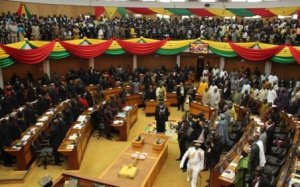A civil society organisation (CSO) has called on Members of Parliament (MPs) to take bold and serious steps to ensure that all mining contracts that come before them are thoroughly scrutinised to avert loss of revenues to Ghana that hurts the national interest.
According to the CSO, the country has lost huge potential revenues that could have boosted the cash-starved economy due to Parliament's approval of bad mining agreements that government had signed with mining companies.
In a press statement issued in Accra, the Centre for Social Impact Studies (CeSIS), a research and advocacy organisation, charged MPs to live up to their legislative responsibilities by subjecting the mining contracts to critical scrutiny. The statement was necessitated by comments made by members of the Public Accounts Committee (PAC) of Parliament on the fiscal regime of the mining industry on Monday, August 23 when officials of the Ministry of Lands and Natural Resources appeared before the PAC to respond to queries concerning the operations of the Ministry.
CESIS stated that when the Chief Executive of the Minerals Commission, Mr Ben Aryee, made a submission on the fiscal regime of the mining industry in Ghana, members of the PAC were surprised at the figures he churned out. The MPs were particularly animated over the fact that most mining companies retain and repatriate 80 per cent of their earnings. Newmont Ghana Gold Limited was particularly singled out because the company has a contract with stability clauses with the Government that permits it to retain 100 per cent of its earnings offshore.
The statement indicated that the MPs were surprised at the figures churned out by Mr Aryee. “We, therefore, find it very strange that Members of Parliament will demonstrate ignorance of this Act, especially when at least two prominent members of the Public Accounts Committee, Hon. Kwaku Agyeman Manu (Chairman of PAC) and Hon. Alban Sumani Kingsford Bagbin, were members of the Parliament that approved both the Newmont and AngloGold Ashanti agreements,” CeSIS said.
It recalled that civil society groups like the National Coalition on Mining (NCOM), Wacam, Integrated Social Development Centre (ISODEC) and Third World Network (TWN) have been raising concerns with the unfavourable stability agreements for over five years at a time when gold prices were at a record high. Unfor-tunately, however, the legislators did not pay attention to the patriotic call of the CSOs.
“In the case of Hon. Agyeman Manu, he was Deputy Minister of Finance from 2001 to 2008, periods when the two agreements were signed. Hon. Isaac K. Asiamah, another member of the Committee has also been a member of the Mines and Energy Sub-Committee of the House at one point or the other and must have known about these agreements,” the CSO observed.
CeSIS expressed worry about the turn of events at the PAC hearing because the impression “is being created that Honourable Members of Parliament do not do due diligence before passing these Mining Agreements that have huge financial ramifications for the economy.” The Centre said that another sad impression is that “our legislators have not been listening to civil society all along. At least with respect to the fiscal arrangements in the mining sector.”
It added that: “This is a critical duty that the Parliament of Ghana cannot fail to perform. That is where we expect the people's representatives to be more proactive in scrutinising these agreements. We would also wish to urge the relevant sub-comittees of Parliament to increase their cooperation with civil society organisations working in the extractive sector so that the necessary information could be given to them.”
The statement reiterated an earlier call made for Ghanaians to support the work of the committee renegotiating fiscal terms of the mining industry headed by Professor Akilagpa Sawyerr. It said the work of the committee provided the best avenue for the country to make the most of its natural resource endowments.
General News of Thursday, 29 August 2013
Source: Public Agenda













